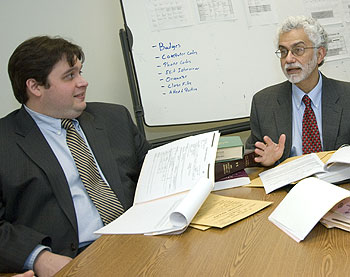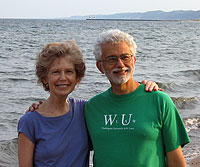What started as preparation for a worst-case scenario has evolved into a varied and distinguished legal career for Peter Joy, J.D., professor of law.
Joy originally began thinking about his future after seeing his father lose a job that he had for nearly 19 years at a pipe-wrapping plant outside of Youngstown, Ohio.

“I knew I wanted to do something where I felt that I could make a difference in people’s lives but also some kind of a profession where, if needed, I could do it on my own,” said Joy. “Watching my father go through a job loss in his early 50s due to a plant closure made me look for a career where I wouldn’t have to rely on someone else for a paycheck.”
Law ended up being the perfect path for Joy.
Clinical pioneer
During law school at Case Western Reserve University, Joy was part of the first group of students that participated in an in-house clinical law program. After working with a nonprofit civil rights organization in Atlanta, Joy returned to teach and work in the clinical program at the Case Western Reserve University School of Law.
“I was interested in the position because the clinical program was the course in law school that I enjoyed the most,” he says.
After teaching in the clinic at Case Western for a few years, Joy developed an interest in legal ethics and started teaching that course as well.
In 1998, Joy joined the Washington University School of Law faculty, where he teaches clinical courses in the clinical program as well as “Trial Practice” and legal ethics courses. He is past president of the Clinical Legal Education Association and past chair of the Association of American Law Schools’ Section on Clinical Legal Education.
“Peter Joy is an internationally recognized clinical lawyer, teacher and scholar,” says Karen Tokarz, J.D., professor of law and director of the law school’s Clinical Education and Alternative Dispute Resolution Programs.
“He is widely acclaimed for his expertise in clinical theory, ethics, trial practice and criminal justice,” Tokarz says. “Peter is passionate about his clients, his students and his research. He is a prince of a guy and one of the best colleagues anybody could ask for. Washington University is so lucky to have him. Our law school’s clinical program is consistently ranked in the top five in the country, in no small part because Peter is a member of our faculty.”
Joy heads the law school’s Criminal Justice Clinic, which is based in a suite of offices in the St. Louis County Public Defender’s Office in Clayton, Mo. Clinic students represent indigent persons charged with crimes who are being represented through the Public Defender’s Office. Students handle bond hearings and preliminary hearings on felony cases and all aspects of misdemeanor cases.
“Clinical education is something I really enjoy,” he says. “It’s very time-consuming and can be a very intense experience. It’s like doctors in medical schools working with interns or residents. You see students really put the theory they are learning into practice and grapple within the ethical dimensions of legal practice.
“This is really the most satisfying work that I could be doing,” he says. “I get the benefits of working with students who are seeing cases for the first time and seeing how to put together a case for a client. It blends what I enjoy about the practice of law with the personal satisfaction of being a teacher.”
|
Peter Joy Family: Partner is Rebecca Dresser, J.D., the Daniel Noyes Kirby Professor of Law and Professor of Ethics in Medicine Education: A.B., education, 1974, Youngstown State University; J.D., 1977, Case Western Reserve University Favorite travel experience: A walk-about in Australia. Joy also enjoys traveling through Japan and Europe Currently reading: “Shadow Family”, a Japanese mystery by Miyuki Miyabe Item of interest: Joy writes a legal ethics column for the American Bar Association’s Criminal Justice magazine Clinical award: The Association of American Law Schools recognized Joy as the top clinical law faculty member in the United States in 2001 |
Emily Hughes, J.D., associate professor of law and Joy’s colleague at the Criminal Justice Clinic, says that Joy “is committed to helping students develop into top-notch professional, ethical attorneys.”
“By teaching students the self-reflective process of learning from their experiences, he empowers students to continue learning long after they have graduated from law school,” she says.
Joy also engages in international clinical work. He has collaborated with law faculty in Japan about clinical legal education and legal ethics issues and has lectured for a number of law schools around Japan.
Broad impact
At the law school, Joy says he does every type of teaching there is.
“Simulation, live client, clinic, large classroom and small seminar classes — I enjoy the variety,” he says.
Joy’s positive impact on the school is reflected in the response from students.
“I read the teaching evaluations that students fill out in the law school,” says Kent D. Syverud, J.D., dean of the School of Law and the Ethan A.H. Shepley University Professor. “Peter Joy’s evaluations always make me proud of the work our faculty does with students inside and outside the classroom. He is a gentle, wise and firm mentor who helps students exceed what they thought was their potential.”
Joy enjoys seeing students acquire knowledge and skills over the course of the semester.
“I see the most professional development in my students in the clinic, where students provide actual representation to clients, and also in the ‘Trial Practice’ class, where they learn how to try a case to a jury,” he says. “This development also happens in classroom courses, too, where by the end of the semester, students are proficient in the subject studied.”
Equal justice
The driving force behind Joy’s broad experience, whether in clinical or private practice, is access to equal justice.
“I’ve had the great fortune to work on so many cases that I’ve really enjoyed,” he says. “It’s funny; in this era of specialization, I think I am probably one of the last lawyers who enjoys handling a diverse range of cases.”
Joy has worked on interesting adoptions, including the adoption of a 61-year-old woman, as well as political asylum cases, cases with battered women, foreclosures, consumer cases, first amendment cases and landlord/tenant issues.
Recently he has done pro bono work regarding academic freedom as it relates to law school clinical programs across the country.

“The latest victory involved a law school environmental law clinic that came under attack from the logging industry to the point where the university was considering shutting down the clinic,” Joy says. “Fortunately, a combination of public opinion and the funders for the environmental law clinic basically said that the clinic work was important, and the university did not buckle under to the big-business interests.”
Joy notes that the Washington University clinical law program has a real access-to-justice focus.
“Every one of the clinics provides legal representation to persons unable to afford to hire lawyers, and scores of clients each year are helped on a variety of issues,” he says. “Without the clinical students and faculty handling their cases, many clients would find the courthouse doors closed to them.”
Joy also appreciates the interdisciplinary efforts of the law school on both the clinical and nonclinical fronts.
“It’s wonderful that we have such close contact with other schools on the Danforth Campus,” he says. “It’s not unusual to see collaborative work being done with faculty members from outside schools and departments like engineering, social work and political science.”
Outside the University and the courtroom, Joy enjoys reading, hiking and traveling.
“I switch off between reading what at least a lot of people would say is real literature and then mystery books, but I think good mystery books qualify as real literature as well,” he says.
“I really like and was delighted to find the Detective Chen series of books by St. Louis-based crime novelist Qiu Xiaolong, a University alum,” he says. “The last book of his that I read is called ‘A Case of Two Cities.’ It’s set in Shanghai and in St. Louis, and Detective Chen is an Eliot scholar, so there is an interesting connection to the University.”
Joy’s planning and preparation has landed him in an ideal position.
“Of course, I’ve now been relying on someone else for a paycheck for the majority of the time that I’ve been a lawyer,” he laughs. “But I’ve been able to work with an exciting group of colleagues and students while helping others.”